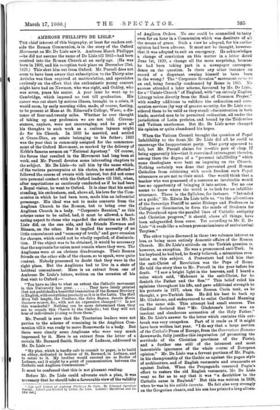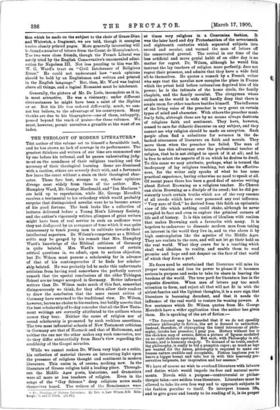AMBROSE PHILLIPPS DE LISLE.*
THE chief interest of this biography, at least for readers out-
side the Roman Communion, is in the story of the Oxford Movement as Mr. De Lisle saw it. Ambrose March Phillipps —he did not assume the name of De Lisle till 18(3—had been received into the Raman Church at an early age. (He was born in 1809, and his reception took place on December 21st, 1825.) This shut him out from Oxford. Mr. Purcell does not seem to have been aware that subscription to the Thirty-nine Articles was then required at matriculation, and speculates curiously on the effect that the enthusiastic young convert might have had on Newman, who was eight, and Oakley, who was seven, years his senior. A year later be went up to Cambridge, which imposed no test till graduation. His career was cut short by serious illness, brought to a crisis, it would seem, by early morning rides, made, of course, fasting, to be present at Mass at St. Edmund's College, Ware; a dis- tance of four-and-twenty miles. Whether he ever thought of taking up any profession we are not told. Circum- stances, anyhow, were not encouraging, and he gave all his thoughts to such work as a zealous layman might do for his Church. In 1833 he married, and settled at Grace-Dieu, an estate belonging to his father ; 1833 was the year that is commonly assigned for the commence- ment of the Oxford Movement, as marked by the delivery of Keble's famous sermon on "National Apostasy." Of course, the forces that resulted in the Movement had long been at work; and Mr. Purcell devotes some interesting chapters to the subject. Mr. De Lisle—to call him by the name which, of the various patronymics at his choice, he most affected— followed the course of events with interest, but did not come into personal contact with the Oxford leaders till 1841, when, after negotiations as cautiously conducted as if he had been a Royal visitor, he went to Oxford. It is clear that his social standing, his enthusiasm, and, above all, his love for the Com- munion in which he had been born, made him an influential personage. His ideal was not to make converts from the Anglican Church to the Roman, but to bring over the Anglican Church in a body. "Corporate Reunion," as this scheme came to be called, had, it must be allowed, a fasci- nating aspect to those who regarded the situation as Mr. De Lisle did, on the one side, and his friends Newman and Bloxam, on the other. Bnt it implied the necessity of no little concealment and "economy of truth," and gave occasion for charges, which could not be wholly repelled, of dissimula- tion. If the object was to be obtained, it would be necessary that the aspirants for union must remain where they were. The Anglicans were at an obvious disadvantage. Their Roman friends on the other side of the chasm, so to speak, were quite content. Nobody presumed to doubt that they were in the right place. But the Anglicans had to live in a state of habitual concealment. Here is an extract from one of Ambrose De Lisle's letters, written on the occasion of his first visit to Oxford :- "You have no idea to what an extent the Catholic movement
in this University has gone They have lately printed (but not published) a beautiful translation of the Roman Breviary in English, with everything precisely as it is in the Latin. The Wail Mary full length, the Confiteor, the Salve Regina, Sancta Maria Succurre miseris, &c.. with not an expression changed ! !! Is not this wonderful ? Nothing can be more determined than they are to reunite this Church to the Catholic ; but they will not hear of individuals joining us from them."
Mr. Purcell is sure that the Tractarian leaders were not parties to the scheme of remaining in the Anglican Com- munion till it was ready to move Romewards in a body. But
there were clearly some Anglicans who were very much impressed by it. Here is an extract from the letter of a certain Mr. Bernard Smith, Rector of Lednam, addressed to Mr. De Lisle :—
" My plan, which is hardly safe to commit to paper, is to build an abbey, dedicated in honour of St. Bernard, in Lednam, and to retire to it. My brother would succeed me as Rector of Lednam, and it might be a point of communication between the Catholic and Anglican Communions."
It must be confessed that this is not pleasant reading. Before Mr. De Lisle could advocate such a plan, it was necessary that he should take a favourable view of the validity Life and Letters of Ambrose Pliillipps be List& By Edmund Spendnur Purcell.. Edited and lantsbed by Edwin De Lisle. London: ILsetn111an and Co. 124s. net.] of Anglican Orders. No one could he counselled to tarry even for an hour in a Communion which *was destitute of all the means of grace. Such a view he adopted, for his earlier opinion had been adverse. It must not be thought, however. that it was adopted to suit an emergency. He acknowledges a change of conviction on this matter in a letter dated June 1st, 1839, a change all the more surprising, because he had been taking part in a newspaper correspon- dence on the question. Is there any other instance on record of a disputant owning himself to have been in the wrong ? The "Corporate Reunion" movement carne to an end, being formally condemned by Rome in 1865. No success attended a later scheme, favoured by Mr. De Lisle, for a " Uniate Church" of England, with "an entirely English Liturgy taken directly from the Book of Common Prayer," with sundry additions to validate the ordination and com- munion services (by way of greater security, for De Lisle con- sidered them to be valid as they stand) administration in both kinds, married men to be permitted ordination, all tinder the jurisdiction of Latin prelates, and bound by the Tridentine and Vatican anathemas. But Mr. De Lisle never changed his opinion or quite abandoned his hopes.
When the Vatican Council brought the question of Papal Infallibility to the front Mr. De Lisle did all he could to encourage the Inopportunist party. That party appeared to fail, but Mr. Purcell claims for it—this part of chap. 17 being apparently his—that it restrained extravagant theories, among them the dogma of a "personal infallibility" which some theologians were bent on imposing on the Church. Nothing certainly was done that prevented good Roman Catholics from criticising with much freedom such Papal utterances as are not to their mind. One would think that a teacher who was possessed of a resource so invaluable would lose no opportunity of bringing it into action. Yet no one seems to know where the world is to look for an infallible utterance. There is the Syllabus, for instance. " Intended as a guide," Mr. Edwin De Lisle tells us, " to the allocutions of the Sovereign Pontiff to assist Bishops and Professors in' Colleges or Seminaries, to form the minds of Students for the Priesthood upon the parallel lines of Catholic antiquity and Christian progress," it should, above all things, have been safeguarded from error. Yet according to Mr. E. De Lisle "it reads like a solemn pronunciamiento of ecclesiastical Toryism."
The other topics discussed in these two volumes interest as leas, as being more entirely domestic affairs of the Roman Church. Mr. De Lisle's attitude on the Turkish question is, however, an exception. He was a pronounced anti-Turk. In his boyhood he had had, he firmly believed, a miraculous reve- lation on this subject. A Protestant had told him that the anti-Christ of Revelation was the Pope of Rome. He told the story thus to Mr. Purcell in the year before his death. "I saw a bright light in the heavens, and I heard a voice which said, Mahomet is the anti-Christ, for he denieth the Father and the Son." This belief ruled his opinions throughout his life, and gave additional strength to his protests in 1677, when the Roman Curia took, as he thought, a pro-Turkish line. He did his best to back up Mr. Gladstone, and endeavoured to enlist Cardinal Manning on the same aide. This attempt had small success. The Cardinal declared that " Mr. Gladstone's letter was an insolent and slanderous accusation of the Holy Father." Mr. De Lisle's answer to the letter which contains this out- break was very outspoken. Part of it reads as if it might have been written last year. "I do say that a large portion of the Catholic Press of Europe, from the Osservatore Romano downwards, fully justifies this imputation (of promoting the servitude of the Christian provinces of the Porte), and a further one still of the intensest and most lamentable ignorance of the whole course of European opinion." Mr. De Lisle was a fervent partisan of Mr. Pagin, in his championship of the Gothic as against the pagan style of architecture, and of English vestments and ornaments as against Italian. When the Propaganda censured Pngin's effort to restore the old English vestments, Mr. De Lisle went so far as to say that it was "a deathblow to the Catholic cause in England." But this was written in 1839, when be was in his calida iuventa. He felt also very strongly on the Gregorian chants, and his son has printed a long anon- ton which he made on the subject to the choir of Grace-Dieu and Whitwick, a fragment, we are told, though it occupies twelve closely printed pages. More generally interesting will b found a number of letters from the Count de Montalembert. Tae two were close friends, though the French Liberal was sorely tried by the English Conservative's unconcealed admi- ration for Napoleon III. Not less puzzling to him was Mr. W. G. Ward's tract on " Civil Intolerance of Religious Error." He could not understand how " such opinions should be held by an Englishman and written and printed in the English language." But, then, Mr. Ward was logical above all things, and a logical Romanist must be intolerant.
Generally, the picture of Mr. De Lisle, incomplete as it is, is most attractive. He was a visionary ; under different circumstances he might have been a saint of the Stylites or er. But his life was ordered differently, much, we can. not but believe, to the advantage of his countrymen. Many thanks are due to his biographers—one of them, unhappily, passed beyond the reach of praise—for these volumes. We must, however, permit ourselves a grumble at the want of an index.

































 Previous page
Previous page